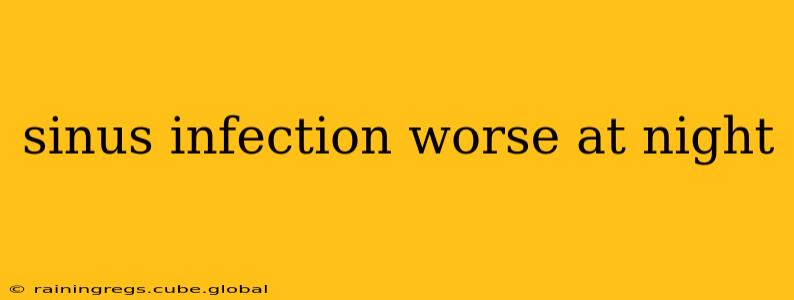Sinus infections, or sinusitis, are a common ailment causing inflammation and discomfort in the sinuses. Many sufferers find their symptoms significantly worsen at night, disrupting sleep and impacting overall well-being. This nighttime exacerbation isn't just about discomfort; it's a complex interplay of factors that amplify the already unpleasant experience. Let's delve into the reasons why your sinus infection might be worse at night and explore effective strategies for finding relief.
Why Are Sinus Symptoms Worse at Night?
This is a frequently asked question, and the answer isn't always straightforward. Several contributing factors often work in tandem to make nighttime sinus pain more intense:
1. Body Position and Fluid Drainage:
When you lie down, the mucus that collects in your sinuses doesn't drain as easily. Gravity plays a crucial role here; during the day, upright posture facilitates drainage. At night, however, this natural drainage process is hampered, leading to a buildup of pressure and inflammation, intensifying pain and discomfort.
2. Changes in Airflow:
While sleeping, your breathing might become shallower and less frequent. This reduced airflow can lead to a buildup of mucus, further contributing to congestion and pressure in your sinuses.
3. Dehydration:
Many people don't drink as much fluid throughout the night. Dehydration thickens mucus, making it more difficult to drain and potentially worsening inflammation.
4. Hormonal Changes:
While not fully understood, some research suggests that hormonal fluctuations throughout the day, particularly at night, might influence the inflammatory response in the sinuses, potentially contributing to increased pain.
5. Temperature and Humidity:
The environment in your bedroom plays a part. If the air is dry, it can further irritate already inflamed sinus membranes, making symptoms worse. Conversely, excessive humidity can also contribute to mold growth which can aggravate the condition.
How Can I Relieve Sinus Pain at Night?
Managing nighttime sinus pain requires a multi-pronged approach. Here are some strategies to alleviate your symptoms:
1. Elevate Your Head:
Using extra pillows to elevate your head can assist in drainage, reducing pressure on your sinuses. Try sleeping with your head elevated at a 30-45 degree angle.
2. Stay Hydrated:
Drinking plenty of fluids throughout the day helps keep mucus thin and easier to drain. Sip water regularly, even during the night if needed.
3. Use a Humidifier:
A cool-mist humidifier can add moisture to the air, easing sinus irritation. Make sure to clean your humidifier regularly to prevent mold growth.
4. Take a Warm Shower or Bath:
The steam from a warm shower or bath can help loosen mucus and ease congestion.
5. Over-the-Counter Medications:
Pain relievers like ibuprofen or acetaminophen can help manage pain. Decongestants can also provide temporary relief, but overuse should be avoided. Always follow the instructions on the label.
6. Saline Nasal Rinse:
A saline nasal rinse can help clear out mucus and reduce inflammation. Follow the instructions on your chosen product carefully.
7. Consider Essential Oils:
Some people find relief from using essential oils like eucalyptus or peppermint, which can help open up airways. However, always dilute essential oils properly before use and avoid using them if you have allergies.
When to See a Doctor for Sinus Infection
While many home remedies can provide relief, persistent or severe sinus infections require medical attention. Consult a doctor if your symptoms are severe, last longer than 10 days, or worsen despite home treatment. They can diagnose the cause of your sinusitis and recommend appropriate treatment, including antibiotics if necessary.
Disclaimer: This information is for general knowledge and informational purposes only, and does not constitute medical advice. Always consult with a qualified healthcare professional for any health concerns or before making any decisions related to your health or treatment.
